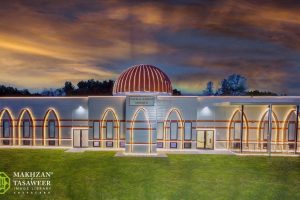Each of the successors of the Promised Messiah(as) is a testimony to the second manifestation of the power of God.
‘…at the time of the demise of the prophet when difficulties mount and the enemy is in full might and thinks that they (the followers of the prophet) are in disarray and is sure that now this community will be destroyed. Even some within the community become hesitant and their backs are broken and some unfortunates among them even apostatise, then God manifests His strong hand of might and sustains the collapsing community. Thus he who shows patience till the end, watches this divine miracle.
You should, therefore, neither grieve over what I have told you (that the hour of my demise is nigh) nor should you be heart-broken for it is mandatory that you see God’s second manifestation. The coming of that manifestation is a lot better for you because it is eternal, the succession of which will not terminate till the end of days. When I go, Allah will send to you the second manifestation and it will stay with you forever.’(1)
Each Khalifa has provided guidance to the Community and each has ensured the message of Ahmadiyyat continues to be carried to all parts of the world. Hadhrat Khalifatul Masih III(ru) was the third successor to the Promised Messiah(as).. He travelled widely, spreading the message of Islam wherever he went. He was the first Ahmadi Khalifa to travel to Africa. A lasting consequence of that historic journey was that the Ahmadiyya Jama’at expanded its efforts in the service of humanity in West Africa. As a result of the selfless efforts of Hadhrat Khalifatul Masih III(ru), the Nusrat Jahan scheme was established, and to this day still continues to provide medical and educational help to West African nations.
Hadhrat Khalifatul Masih III(ru) also established mosques and missions in various parts of Europe. It was under his guidance and leadership that the Ahmadiyya community has the honour of witnessing the historic return of Islam to Spain.
‘Love for All, Hatred for None’, is the simple phrase that became established as the slogan of the Ahmadiyya Muslim community during this Khilafat. For far too long, Islam had lived under the shadow of militancy and ‘holy war’. That was not the message with which the Holy Prophet(saw) won the hearts of millions – not through war, but peace; not through hatred, but love. Those simple words are also a lasting testament to the behaviour of the members of the Ahmadiyya community during the severe anti-Ahmadi hostilities which took place in 1974, hostilities which were borne with patience and fortitude under the guidance of Hadhrat Khalifatul Masih III(ru) .
Hadhrat Khalifatul Masih III(ru) argued that Islam granted absolute freedom of choice in matters of faith and conscience and there was no earthly penalty prescribed for apostasy. In a sermon delivered on Friday 29 December, 1978, he said:
‘Freedom of conscience and freedom of belief are the fundamental rights of man. His very creation is for that purpose. If man is not free in respect of these matters, if people are to be driven forcibly into Islam like sheep and goats, then there can be no recompense by God, the One and Unique, for any human action. Will you compel God Almighty to accept the hypocritical actions of people performed by them under compulsion so that God Himself must love them under compulsion? Would you force some one to declare himself a Muslim and assure him that though his heart is not convinced of the truth of Islam, yet if he performs the Salat for show, God would reward him for it and would not be aware of his hypocrisy and the true condition of his heart? God affirms that He is fully aware of the secrets of your hearts and yet you think that He would be unaware of all this. If He is aware of it how would He reward such hypocritical action beneficently? On the other hand, if a person’s heart is filled with sincere faith and devotion and with perfect understanding of God and His attributes and loves Muhammad(saw) and out of that love he obeys God Almighty and worships Him, and all the powers of the world combine in the declaration that he is expelled from Islam and that God would not deal with him out of love and would not bestow upon him the best recompense for his righteous actions, would God be compelled to accept and act upon their verdict? Indeed not. Those who submit to Him sincerely and with perfect goodwill will continue to win His love; let the world say what it will and think what it will. Keep supplicating, therefore, that God Almighty should not let Satan create any doubt in our minds and that our devotion and our worship may not be tainted with show or hypocrisy…
We esteem ourselves as Muslims; we are Muslims. We have never thought of departing from Islam. We deem it a curse that our tongues should say that we are not Muslims, that we have abandoned God and that (God forbid) we do not believe in Muhammad(saw), the Messenger of Allah. It is not possible that we should depart from the light and the truth with which this world is illumined, and which we have seen with our own eyes and so flounder in darkness. It is true, however, that man is weak and cannot achieve God’s mercy and His blessing without His support and grace. Continue to supplicate that you may remain secure in the citadel of the mercy of God Almighty and that His angels should continue to safeguard you against going astray and that every moment you should win the love of God. Nothing more is needed…’(2)
Amongst many other matters, he was a member of the Academic council and Senate of the Punjab University, a Patron of Badminton, Basketball, Mountaineering and Rowing Clubs. An English translation of Hadhrat Khalifatul Masih III(ru) delivered on 12 June 1970 on his return to Rabwah from Africa, is available as ‘Message of Love and Brotherhood to Africa;’ his 23 great objectives of building the House of Allah provide a deep insight into his comprehensive knowledge of Islam; on 17 December, 1965, he instructed the Jama’at to feed the poor, orphans and prisoners; in 1967, he launched a struggle to remove evil customs followed slavishly by Muslims; he insisted that the community should ensure that all Ahmadis are educated up to matriculation; in 1974, he asked the community to always remain cheerful and to keep smiling; his ‘Prayer of the Heart’ was published in The Review of Religions in April 1992 and he promoted healthy living by advocating horse-riding, using soya lecithin and honey.
Another achievement
God Almighty revealed to the Promised Messiah(as):
“He (God) has conveyed to me that my followers will excel so much in knowledge and insight that they will confound all others with the light of their truth, their reasoning and their signs.” (Tajalliyaat-e-Ilaahiyyah, p.21)(2)
The above prophecy has been fulfilled in various forms many times over, and will, God willing, continue to do so. During the blessed tenure of the Third Khilafat, this prophecy was magnificently manifested in the person of the late Professor Abdus Salam. He was a renowned scientist who received the Nobel Prize in physics in 1979. He was the first Muslim and the first Pakistani to receive the prestigious award.
Hadhrat Khalifatul Masih III(ru) also sent him a message of warm greetings stating that it was a matter of great pride that the first Muslim ever and the first Pakistani scientist to receive the Nobel Prize was an Ahmadi.
Last days
Hadhrat Sayyida Mansoora Begum, first wife of Hadhrat Khalifatul Masih III(ru), passed away on 3 December 1981 after a short illness. He bore this loss with fortitude. After a while he decided to remarry and supplicated for forty days. Reassured by virtue of his entreaties to God Almighty, he married Sayyida Tahira Siddiqa sahiba, daughter of a devout Ahmadi, ‘Abdul Majeed Khan of Weerowal on 11 April 1982.
A few months later in June 1982 while Huzur was visiting Islamabad, he suffered a severe heart attack. Then at 00.45 a.m., on 9 June, 1982, in Islamabad at the age of seventy-three he passed away. May his soul rest in peace.
His body was brought to Rabwah where the newly-elected Khalifa, Hadhrat Mirza Tahir Ahmad, Khalifatul Masih IV(ru) led the funeral prayer. Close to one hundred thousand people attended the funeral. He was buried next to the tomb of Hadhrat Khalifatul Masih II(ra) in the reserved section of the Bahishti Maqbara in Rabwah.
References:
1. Al-Wasiyyat, pp. 6-7)
2. Hadhrat Khalifatul Masih III(ru), Freedom of Faith and Conscience in Islam, (English translation of the sermon, Friday 29 December, 1978)




Add Comment